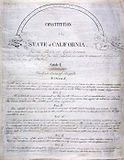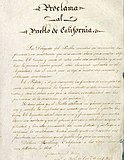| Constitution of the State of California Constitución del Estado de California (Spanish) | |
|---|---|
|
Title pages of the original English (left) and Spanish (right) versions of the 1849 Constitution | |
| Overview | |
| Jurisdiction | State of California |
| Subordinate to | Supreme law of the United States |
| Created | 13 October 1849 |
| Ratified | 7 May 1879 |
| History | |
| Amendments | 514 |
| Location | California Capitol Museum, Sacramento, California |
| Author(s) | Monterey Convention of 1849 |
| Signatories | 48 delegates |
 |
|---|
The Constitution of California (Spanish: Constitución de California) is the primary organizing law for the U.S. state of California, describing the duties, powers, structures and functions of the government of California. California's constitution was drafted in both English and Spanish by American pioneers, European settlers, and Californios (Hispanics of California) and adopted at the 1849 Constitutional Convention of Monterey, following the American Conquest of California and the Mexican–American War and in advance of California's Admission to the Union in 1850.[1] The constitution was amended and ratified on 7 May 1879, following the Sacramento Convention of 1878–79.[2]
Many of the individual rights clauses in the state constitution have been construed as protecting rights even broader than the United States Bill of Rights in the Federal Constitution. An example is the case of Pruneyard Shopping Center v. Robins, in which "free speech" rights beyond those addressed by the First Amendment to the United States Constitution were found in the California Constitution by the California courts.[3] One of California's most significant prohibitions is against "cruel or unusual punishment," a stronger prohibition than the U.S. Constitution's Eighth Amendment prohibition against "cruel and unusual punishment."
The Constitution of California is among the longest in the world.[4] This is predominantly due to additions by California ballot propositions, which allow enacting amendments by a simple majority vote in a referendum. Since its enactment, the California constitution has been amended an average of five times each year.[5] As a result, if California were a sovereign state, its constitution would rank the second or third-longest in the world by total number of words.[5][6] This has led politicians and political scientists to argue the procedures for amending the California constitution are too lax, creating a state constitution that is filled with irrelevant detail and incoherent policies created by conflicting majorities attempting to impose their will on each other by the ballot process.[5]
- ^ "California Secretary of State -1849 California Constitution Fact Sheet". Archived from the original on November 9, 2017. Retrieved May 1, 2018.
- ^ 1879 California constitution. Retrieved January 3, 2018.
- ^ Linda Greenhouse, "Petitioning Upheld at Shopping Malls: High Court Says States May Order Access to Back Free Speech," The New York Times, 10 June 1980, A1.
- ^ Janiskee, Brian; Ken Masugi (July 27, 2007). "2". Democracy in California: Politics and Government in the Golden State (2 ed.). Rowman & Littlefield Publishers, Inc. p. 27. ISBN 978-0-7425-4836-7.
- ^ a b c Gatto, Mike (June 19, 2014). "Op-Ed: It's time to declutter California's messy Constitution". Los Angeles Times. Retrieved June 25, 2024.
- ^ Center, California Constitution (June 24, 2017). "California's Constitution is Not the Longest". SCOCAblog. Retrieved June 25, 2024.

